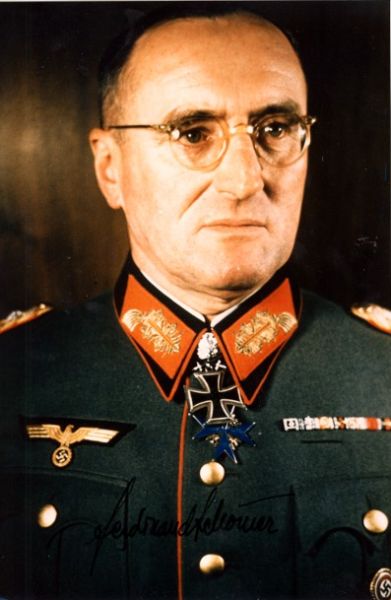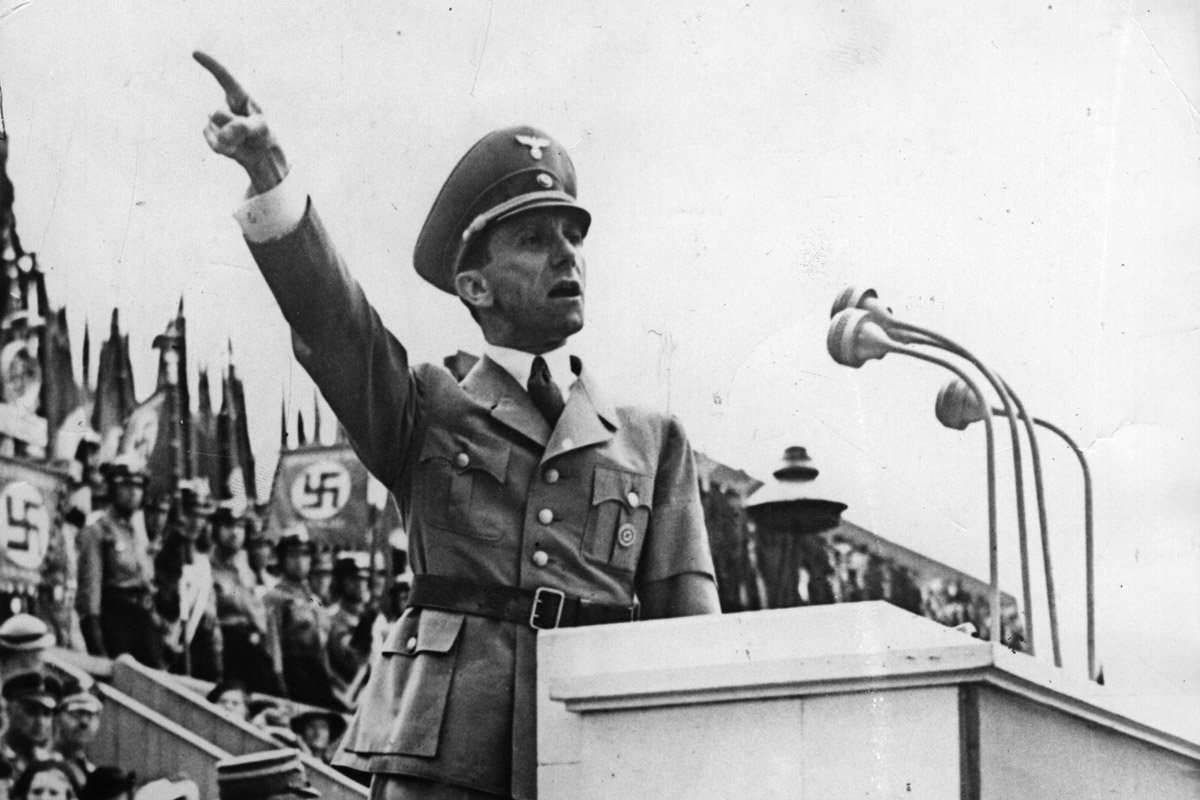Schörner, Johann Ferdinand
- Date of birth:
- June 12th, 1892 (Munich/Bavaria, Germany)
- Date of death:
- July 2nd, 1973 (Munich/Bavaria, Germany)
- Nationality:
- German
Biography
Johann Ferdinand Schörner was, among other decorations, decorated with the Pour la Merite (5th December 1917, Leutnant der Reserve; Führer 12. / Bayerischer Leib-Infanterie-Regiment) during the First World War. In Hitler's Last Will, Schörner was to be appointed to Oberbefehlshaber des Heeres.
Do you have more information about this person? Inform us!
- Period:
- Second World War (1939-1945)
- Rank:
- Major
- Awarded on:
- December 21st, 1934
- Period:
- Second World War (1939-1945)
- Awarded on:
- October 2nd, 1936
- Period:
- Second World War (1939-1945)
- Awarded on:
- October 2nd, 1936
- Period:
- Second World War (1939-1945)
- Awarded on:
- October 2nd, 1936
- Period:
- Second World War (1939-1945)
- Awarded on:
- August 2nd, 1938
- Period:
- Second World War (1939-1945)
- Unit:
- Kommandeur Gebirgsjäger-Regiment 98
- Awarded on:
- September 12th, 1939
Had already received the Iron Cross 2nd Class on December 22nd 1914.
- Period:
- Second World War (1939-1945)
- Unit:
- Kommandeur Gebirgsjäger-Regiment 98
- Awarded on:
- September 20th, 1939
Had already received the Iron Cross 1st Class on January 27th 1917.
- Period:
- Second World War (1939-1945)
- Rank:
- Generalmajor (Brigadier)
- Unit:
- Kommandeur 6.Gebirgs-Division / XVIII.Armee-Korps / 12.Armee
- Awarded on:
- April 20th, 1941
“Before dawn on the 06.04.1941 Generalmajor Schörner (commander of the 6. Gebirgs-Division) and his troops succeeding in overrunning the enemy outposts on the snow covered Belaaica mountain through a surprise thrust. There two enemy bunker lines of the Metaxas Line were penetrated, and before long the whole division was in position in the valley before the enemy line at the Krusa mountain.
Later on the 08.04.1941, and on his own initiative, Schörner launched a surprise attack against the Allied forces on the northern part of the Krusa mountain. He and his men successfully ejected the defenders from this area and advanced towards Salonika. In conjunction with the advancing 2. Panzer-Division, these actions contributed significantly to the fall of Greece/Macedonia.”
268th Award.
- Period:
- Second World War (1939-1945)
- Unit:
- Kommandeur 6.Gebirgsjäger-Division
- Awarded on:
- August 20th, 1942
- Period:
- Second World War (1939-1945)
- Awarded on:
- January 30th, 1943
- Period:
- Second World War (1939-1945)
- Rank:
- General der Gebirgstruppe (Lieutenant General of Mountain Forces)
- Unit:
- Kommandierender General XXXX.Panzerkorps / 6.Armee / Heeresgruppe A
- Awarded on:
- February 17th, 1944
“Schörner has been in command of the Nikopol bridgehead since the 25.11.1943. The Wehrmachtbericht of 18.02.1944 goes into further detail as to the achievements of Schörner and his men in this area in their battles against a relentless enemy. Great difficulties were encountered during the evacuation of the bridgehead (which began on 04.02.1944) due to the extremely bad roads and terrain. Through the leadership and skillful handling of the commanding general (who could always be found at the hot spots of the front), as well as the bravery and dedication of his men, it was possible to carry out the planned withdrawal movements successfully.”
398th Award
- Period:
- Second World War (1939-1945)
- Awarded on:
- February 18th, 1944
- Period:
- Second World War (1939-1945)
- Rank:
- Generaloberst (General)
- Unit:
- Oberbefehlshaber Heeresgruppe Nord (Suppreme Commander Heeresgruppe Nord)
- Awarded on:
- August 28th, 1944
“Generaloberst Ferdinand Schörner is the commander-in-chief of our troops fighting in the Courland region, against whom the surge of enemy forces from the east has failed to overcome for many weeks. Despite already having been cut off once completely, our troops in Courland have defied all the odds as the cornerstone of the Eastern front. They embodied the spirit of their commander-in-chief, and his skillful leadership has guided them to a victorious outcome over the course of incessant battle against the hordes of enemies.”
93rd Award
- Period:
- Second World War (1939-1945)
- Awarded on:
- November 30th, 1944
- Period:
- Second World War (1939-1945)
- Awarded on:
- January 1st, 1945
- Period:
- Second World War (1939-1945)
- Rank:
- Generaloberst (General)
- Unit:
- Oberbefehlshaber Heeresgruppe Nord (Suppreme Commander Heeresgruppe Nord)
- Awarded on:
- January 1st, 1945
23rd Award
- Period:
- Second World War (1939-1945)
- Awarded on:
- April 5th, 1945
- Period:
- Second World War (1939-1945)
- Awarded on:
- May 9th, 1945
- Period:
- Second World War (1939-1945)
- Unit:
- Oberbefehlshaber Heeresgruppe Nord
- Period:
- Second World War (1939-1945)
- Period:
- First World War (1914-1918)
- Period:
- First World War (1914-1918)
- Awarded on:
- June 1915
- Period:
- First World War (1914-1918)
- Period:
- Second World War (1939-1945)
- Period:
- Second World War (1939-1945)
- Period:
- Second World War (1939-1945)
- Period:
- Second World War (1939-1945)
- Rank:
- Hauptmann (Captain)
- Awarded on:
- May 1933
Sources
- Photo 1: Willi Schumacher Collection
- - THOMAS, FRANZ & WEGMANN, GüNTER, Die Ritterkreuzträger der Deutschen Wehrmacht 1939-1945, Biblio-Verlag, 1993.
- Kwasny A., Kwasny G., Die Eichenlaubträger 1940-1945 (CD), Deutsches Wehrkundearchiv, Lage-Waddenhausen, 2001
- Fellgiebel W.P., Die Träger des Ritterkreuzes des Eisernen Kreuzes 1939-1945, Podzun-Pallas, 2000
- Lexikon der Wehrmacht
- Der Photosammler
- Ritterkreuztraeger 1939 - 1945
- Axis History Biographical Research Axis History Forum





























